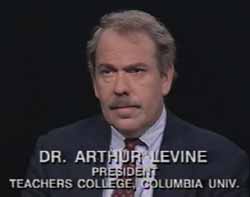The Open Mind features President Levine
Quoting from the essay itself about America's crisis mentality, where Levine writes that initiatives, philanthropic dollars, and media coverage will follow a crisis only so far until the next one comes along, Heffner queried, "What does that insight bode for the future well being of the education of our children?"
Levine noted his concern that the education agenda, which was a top priority up to 9/11, may not stay on the national agenda much longer. "My feeling about that is that we've done a fine job in education for affluent children, and we're doing a good job for middle class kids," Levine said. "The group that we've failed in education is poor kids."
After the attacks of September 11th, Levine expected education to fall from the nation's list of priorities. "What I expected to happen on September 12th was an announcement that since we are at war, we're going to have to delay all of our domestic programs and move full forward in the direction of the war and the external threats that we face. I was shocked when education remained a key priority for the President."
Since many of the states are running deficits due to tax cuts, Levine explained that the states would have to cut somewhere, and with the biggest chunk of the budget being education, that would be the most likely target. What he said states have chosen to do is to cut more deeply into higher education than into K-12 education.
Levine also makes the point that when comparing our suburban schools against any country in the world, the United States looks very good. In urban areas, affluent families and middle class families have choices of where their children go to school. "It's been fixed in such a way that the only people who are left who have to attend really poor schools are poor people and minorities," he said, adding, "And those are people who, for the most part, don't vote at the rates other parts of the population do and who are not going to take to the streets and say, I'm mad as hell and I'm not going to send my kid to those schools."
Politicians, he said, may talk about this being an important issue, but they do nothing about it.
Heffner's response was to ask, "You're saying that we can pay lip service because there is no political price to pay if we only pay lip service to expanding the educational opportunities of people who are less well off?"
Yes, Levine said, but he is optimistic for a number of reasons. First, because he believes that the schools can be turned around and children in those schools can be saved.
To do it, he cited ways such as going to the courts to get a greater share of resources for the cities; educating parents to make them better consumers of schools and to make schooling an even higher objective for them; through voucher programs for children in failing schools to get them out of those schools.
"Why would I be optimistic? Why would I stay in a field like this?" Levine said. "Because there are answers. Because this can be changed. Because we can solve these kinds of problems. It's not a matter of lacking answers. It's lacking will to impose the answers or to solve the problems. And I'm optimistic as long as there's an answer and we can work for a solution."
To find that solution, he talked about state elections in 1992, in which six were decided by minority votes for Governor or Senator. If parents of children in these failing schools told politicians, "This is it. You want our votes, do this," Levine said, he believes it would produce some action. Formal programs that bring people from the community together to hear about what creates successes and what creates the differences between them and those in more affluent areas. "Understanding what the differences are. Understanding how their kid can take the same route. It's making those routes real," Levine said.
Published Monday, Feb. 10, 2003
